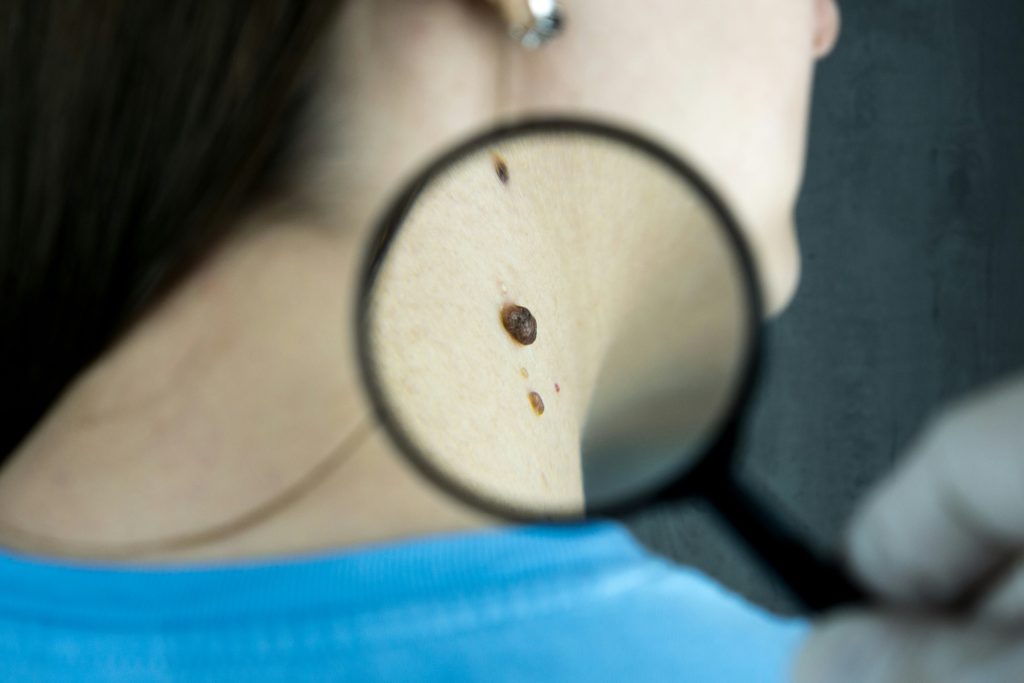On the surface, a dermatologist specialises in treating skin, hair, and nail conditions. But there’s much more to it than that.
In this blog, we’ll take a look at the role a dermatologist plays in your health journey, the treatments and procedures they provide, the triggers that would cause you to see a dermatologist in the first place, and what a dermatologist can do for your skin.
First off, Medical vs. Cosmetic Dermatology – what’s the difference?
Medical dermatology focusses on diagnosing and treating diseases of the skin, hair, and nails. This includes conditions like eczema, psoriasis, infections, and skin cancers.
Meanwhile, cosmetic dermatology aims to enhance appearance through non-invasive or minimally invasive procedures, such as injectables, lasers, and skincare products.
These two areas often overlap—for example, treating acne may involve both medical treatment (like antibiotics) and cosmetic options (like scar revision).
So, what are the common skin conditions treated by dermatologists?
There are various skin conditions a dermatologist can treat, ranging from common to rare. The most common conditions are as follows:
Acne
Acne is caused by a build-up of oil and dead skin cells, which can block pores, leading to redness, irritation, and the telltale whitehead. And while it does commonly affect teenagers, acne can also be caused by different hormones and lifestyle factors, impacting people of all ages.
Common acne tends to clear up on its own. But aggressive, ongoing acne can be treated by a dermatologist. They can help you identify the type of acne you have, and provide advice on the treatment options that will be best for your skin. This could be an over-the-counter skin cream or wash, ointments, or, in severe cases, antibiotics or topical corticosteroids.
Eczema and other inflammatory skin conditions
Eczema is a fairly common condition that affects around 1 in 10 Australian adults.
Eczema makes it harder for your skin to retain moisture, and it gets easily irritated. This makes it more susceptible to allergens, which then release chemicals in your skin, causing it to become dry, itchy, or bumpy.
Symptoms can affect people at any age, but generally start during childhood and last into adulthood. If you or a child starts to get patches of dry, itchy skin, it’s recommended to see a dermatologist. Your dermatologist can identify the type of eczema you have, refer you to an allergy test to identify your triggers, and then provide the best treatment options, dressings, or moisturisers that will help you manage your condition.

Skin cancer and precancerous lesions
With a referral to a dermatologist, you can get a full body skin check, where they look over your skin carefully with a device known as a dermatoscope.
A dermatoscope magnifies the skin, allowing your dermatologist to identify any signs of skin cancer, whether it’s freckles, moles, or precancerous lesions. If your dermatologist identifies a spot that concerns them, they can perform a skin biopsy to remove part of it and send it off for testing.
It’s good practice to see a dermatologist once a year for a skin check, to give yourself the best chance of keeping you and your skin healthy.
Cosmetic skin concerns
A dermatologist predominantly treats skin conditions, but they also support you with cosmetic skin procedures.
A dermatologist is qualified to provide anti-aging treatments like Botox and dermal fillers. They can provide treatments to remove or fade scarring or pigmentation, help reduce the appearance of cellulite, and undertake laser hair removal. Some dermatologists are even qualified to perform laser tattoo removal.
When you see a dermatologist for cosmetic skin concerns, you get peace of mind that you’re going to a qualified, specially-trained medical doctor.
Book an appointment with a dermatologist today
Your skin is your largest organ, so you must give it the care it needs. And when it comes to skin conditions, a dermatologist is here to help you keep your skin happy and healthy.
At Brecken Health Care, we have specialised dermatologists in our team who can provide advice and guidance to manage your skin conditions. Get in touch with us to learn more.
